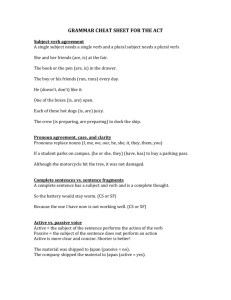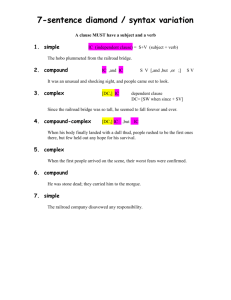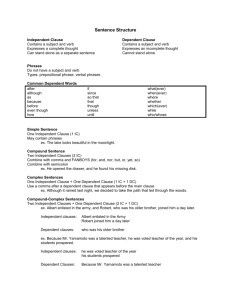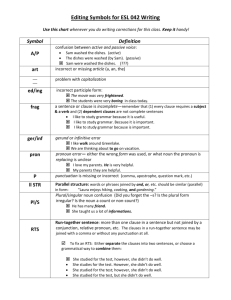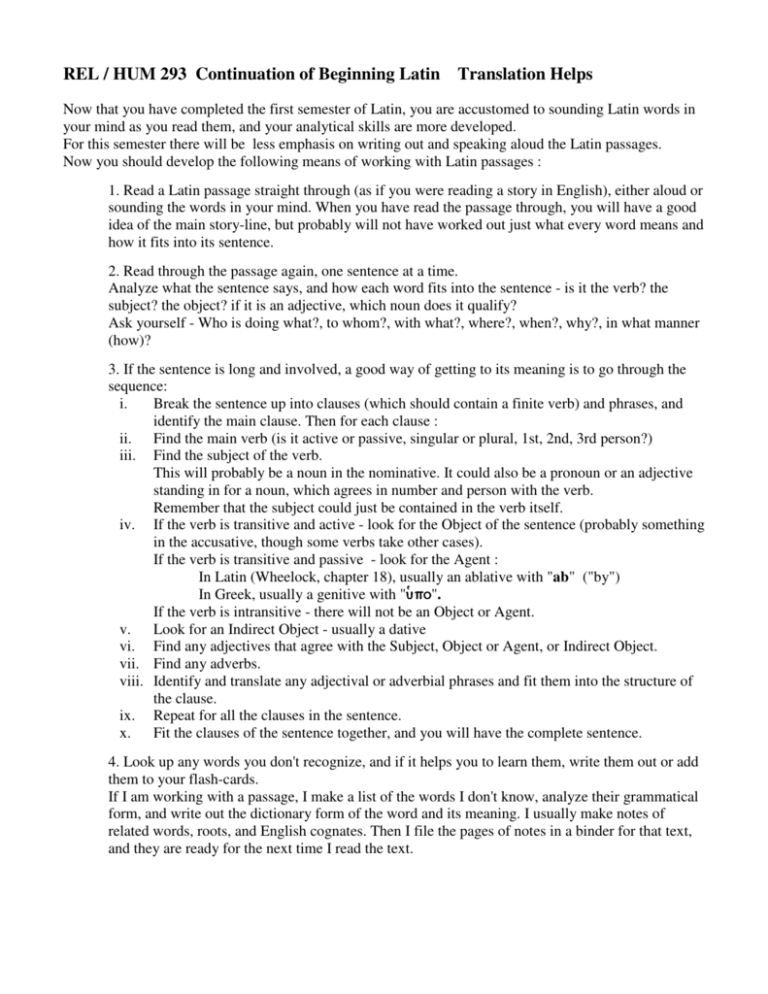
REL / HUM 293 Continuation of Beginning Latin Translation Helps
Now that you have completed the first semester of Latin, you are accustomed to sounding Latin words in
your mind as you read them, and your analytical skills are more developed.
For this semester there will be less emphasis on writing out and speaking aloud the Latin passages.
Now you should develop the following means of working with Latin passages :
1. Read a Latin passage straight through (as if you were reading a story in English), either aloud or
sounding the words in your mind. When you have read the passage through, you will have a good
idea of the main story-line, but probably will not have worked out just what every word means and
how it fits into its sentence.
2. Read through the passage again, one sentence at a time.
Analyze what the sentence says, and how each word fits into the sentence - is it the verb? the
subject? the object? if it is an adjective, which noun does it qualify?
Ask yourself - Who is doing what?, to whom?, with what?, where?, when?, why?, in what manner
(how)?
3. If the sentence is long and involved, a good way of getting to its meaning is to go through the
sequence:
i.
Break the sentence up into clauses (which should contain a finite verb) and phrases, and
identify the main clause. Then for each clause :
ii. Find the main verb (is it active or passive, singular or plural, 1st, 2nd, 3rd person?)
iii. Find the subject of the verb.
This will probably be a noun in the nominative. It could also be a pronoun or an adjective
standing in for a noun, which agrees in number and person with the verb.
Remember that the subject could just be contained in the verb itself.
iv. If the verb is transitive and active - look for the Object of the sentence (probably something
in the accusative, though some verbs take other cases).
If the verb is transitive and passive - look for the Agent :
In Latin (Wheelock, chapter 18), usually an ablative with "ab" ("by")
In Greek, usually a genitive with "u(
u(po".
o
If the verb is intransitive - there will not be an Object or Agent.
v.
Look for an Indirect Object - usually a dative
vi. Find any adjectives that agree with the Subject, Object or Agent, or Indirect Object.
vii. Find any adverbs.
viii. Identify and translate any adjectival or adverbial phrases and fit them into the structure of
the clause.
ix. Repeat for all the clauses in the sentence.
x. Fit the clauses of the sentence together, and you will have the complete sentence.
4. Look up any words you don't recognize, and if it helps you to learn them, write them out or add
them to your flash-cards.
If I am working with a passage, I make a list of the words I don't know, analyze their grammatical
form, and write out the dictionary form of the word and its meaning. I usually make notes of
related words, roots, and English cognates. Then I file the pages of notes in a binder for that text,
and they are ready for the next time I read the text.
Example : Hebrews, chapter 1, verses 1-4
This sentence is quite complicated - you will not have to deal with this degree of
complexity until the 400-level language courses. I am using it as an example to show how
even long and complex sentences can be analyzed and translated.
English :
God, who at sundry times and in diverse manners spake in times past unto the fathers by
the prophets, hath in these last days spoken unto us by his Son, whom he hath appointed
heir of all things, by whom also he made the worlds; who being the brightness of his glory,
and the express image of his person, and upholding all things by the word of his power,
when he had by himself purged our sins, sat down on the right hand of the Majesty on
high; being made so much better than the angels, as he hath by inheritance obtained a more
excellent name than they.
Greek :
Polumerwj kai polutropwj palai o( Qeoj lalhsaj toij patrasin e0n
toij profhtaij e0p' e0sxatou twn h(merwn toutwn e)lalhsen h(min e0n ui(w|,
o(n e0qhken klhronomon pantwn, di' ou( kai e)poihsen touj ai)wnaj: o(j w)n
a)paugasma thj dochj kai xarakthr thj u(postasewj au)tou, ferwn te
ta panta tw| r(hmati thj dunamewj au)tou, kaqarismon twn a(martiwn
poihsamenoj e0kaqisen e0n decia| thj megalwsunhj e0n u(yhloij, tosoutw|
kreittwn genomenoj twn a)ngellwn o(sw| diaforwteron par' au)touj
keklhronomhken o)noma.
Latin :
Multifariam, multisque modis olim Deus loquens patribus in prophetis: novissime, diebus
istis locutus est nobis in Filio, quem constituit haeredem universorum, per quem fecit et
saecula; qui cum sit splendor gloriae, et figura substantiae eius, portansque omnia verbo
virtutis suae, purgationem peccatorum faciens, sedet ad dexteram maiestatis in excelsis:
tanto melior angelis effectus, quanto differentius prae illis nomen haereditavit.
i. Clauses : look for relative pronouns to help find clauses :
"who . . . prophets" (The Greek and Latin passages use an Aorist or Past participle ("having
spoken") instead of a Relative Pronoun - English uses a Relative Pronoun, "who", - "who" is the
nominative, so is describing the Subject of the sentence)
"whom . . . things" "o(n . . . pantwn", "quem . . . universorum" - the Relative Pronoun is in
the accusative, so this phrase is describing the Object of the sentence.
"by whom . . . worlds" " di' ou( . . .touj ai)wnaj" "per quem . . . saecula; - the Relative
Pronoun is qualified by a preposition indicating "the agent by which someone did something"
"who . . .sat down . . on high" "o(j . .e0kaqisen . .e0n u(yhloij" " qui . . sedet . . in excelsis:"
A long clause, containing a subsidiary clause and several subsidiary phrases, describing "Son"
"being made so much better than the angels" "tosoutw| kreittwn genomenoj twn a)ngellwn:"
" tanto melior angelis effectus" - this is a phrase rather than a clause (no finite verb) containing a
participle (being made, genomenoj, effectus). When the main structure of the sentence has been
worked out, it will be easier find which noun this phrase describes. The masculine singular
nominative endings of genomenoj and "effectus" tell us to look for a masculine singular noun.
"as he hath . . than they" "o(sw| . . keklhronomhken o)noma" "quanto differentius prae illis
nomen haereditavit" - "as" " o(sw|" and "quanto" indicate that this is a subsidiary clause. When
the main structure of the sentence has been worked out we will be able to fit this clause to the
correct noun. The verb in the clause is 3rd person singular, so we will need to fit it to a singular
noun or pronoun.
Putting the subsidiary clauses aside, we are left with the main statement of the sentence :
"God . . hath in these last days spoken unto us by his Son"
"o( Qeoj . . e0p' e0sxatou twn h(merwn toutwn e)lalhsen h(min e0n ui(w"|
"Deus . . novissime, diebus istis locutus est nobis in Filio"
Even if one cannot translate any more of the sentence, one has its main idea.
ii. To go further with this clause (or any clause) - look for the verb.
"hath spoken" "e)e)lalhsen"
alhsen "locutus est" :
Third person singular active (and the Latin tells us "masculine")
"to speak" can be either transitive eg. "he speaks good words" or intransitive eg. "he
speaks", and it can have an Indirect Object eg. "he speaks to the crowd"
iii. Look for the Subject - this is easy in all the languages - "God", "Deus", "Qeoj"
Greek even uses "o(" with "Qeoj" - this is one of the easiest ways of finding the Subject in Greek.
Now we have "God has spoken"
iv. None of the words is in the accusative, so we probably do not have a Direct Object.
v. There is an Indirect Object (dative)
"unto us" "h(min" "nobis"
Now we have "God has spoken to us"
vi. There are no adjectives to fit with the Subject or Indirect Object
vii. Adverbs to describe the verb - Latin uses "novissime" (lastly, at the end, in the last place).
English and Greek use an adverbial phrase (see viii.)
viii. Adverbial phrases :
"Time when" "in these last days"
"e0p' e0sxatou twn h(merwn toutwn" (at the end of these days)
"novissime, diebus istis" (lastly / in the last place / at the last time, in these days)
and "Means by which" "by His Son" "e0n ui(w"| "in Filio"
English adds "his" to describe "Son", but neither Latin nor Greek do this.
ix. One can now work through the other clauses in a similar manner, until the whole sentence is
translated. Even if the other clauses do not "fall into place", we still have the main statement.
This sentence is an example of how Paul and other writers might get carried away by the thought of Jesus,
and add a string of phrases and clauses expressing thanks and glory.
Copyright © 2009 Shirley J. Rollinson All Rights Reserved



